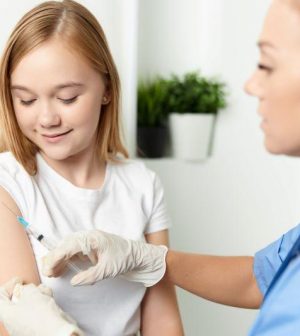- Could Your Grocery Store Meat Be Causing Recurring UTIs?
- Are You Making This Expensive Thermostat Error This Winter?
- Recognizing the Signs of Hypothyroidism
- 10 Strategies to Overcome Insomnia
- Could Artificial Sweeteners Be Aging the Brain Faster?
- Techniques for Soothing Your Nervous System
- Does the Water in Your House Smell Funny? Here’s Why
- Can a Daily Dose of Apple Cider Vinegar Actually Aid Weight Loss?
- 6 Health Beverages That Can Actually Spike Your Blood Sugar
- Treatment Options for Social Anxiety Disorder
Vaccination Cuts Odds for Long COVID in Kids

Vaccination can protect young people — particularly teenagers– against long COVID, a new study finds.
Records of more than 1 million U.S. kids showed that the COVID jab can effectively shield kids from long-term health problems related to the infection, according to findings published Jan. 16 in the journal Pediatrics.
Using electronic health data from 17 U.S. health systems, researchers estimated that about 4.5% of kids ages 5 to 17 probably have had long COVID.
However, only 0.7% of the kids actually received a proper long COVID diagnosis.
“Using clinical data from across health care networks allowed us to have a large enough sample of patients to identify rare effects of the virus and its impact on children,” said lead researcher Hanieh Razzaghi, director of analytics for the PEDSnet Data Coordinating Center at the Children’s Hospital of Philadelphia.
Initial COVID infections tend to strike adults harder than children, but it’s been tough to figure out how kids are affected by long COVID, researchers said in background notes.
That’s because the symptoms of long COVID can vary widely, and it’s still not understood how the virus causes them, the researchers said.
Long COVID symptoms can include brain fog, shortness of breath, gastrointestinal issues, pain, fatigue, chronic inflammation and heart problems.
The overall vaccination rate among the children included in the study was 56%.
Researchers found 35% effective protection against probable long COVID and 42% protection against diagnosed long COVID within a year of receiving the vaccine as a child.
Protection was more robust for adolescents ages 12 to 17 (50%) than for children ages 5 to 11 (24%).
Further, protection against long COVID was highest at six months after receiving the jab (61%), but waned to about 11% at 18 months post-vaccination.
Children who were vaccinated after recovering from a COVID infection also appeared to benefit, with a vaccine effectiveness of 46% against probable long COVID.
“This study provides us with important data showing the protective effects of the vaccine against long-haul COVID and suggests that this protection is mostly from preventing visible infections,” said senior researcher Dr. Charles Bailey, an associate professor of pediatrics with the Children’s Hospital of Philadelphia.
“We hope this means that as vaccines are improved to be more effective against current strains of SARS-CoV-2, their protection against long COVID will get better, too,” Bailey added in a hospital news releas.
More information
The Cleveland Clinic has more about long COVID in kids.
SOURCE: Children’s Hospital of Philadelphia, news release, Jan. 16, 2024
Source: HealthDay
Copyright © 2026 HealthDay. All rights reserved.










